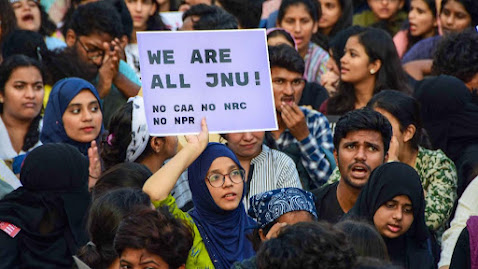JNU prohibits campus protests, hefty penalties, expulsion for slogans and dharnas; JNU student union said this
New Delhi: Jawaharlal Nehru University (JNU) has expanded the restricted zone on campus for certain activities. The revised regulations now prohibit the posting of posters or staging protests within 100 meters of academic buildings where classes are conducted.
Violations of this rule, as well as actions inciting intolerance towards religion, caste, or community, or deemed "anti-national," may result in fines up to Rs 20,000 or expulsion from the university.
An "anti-national" slogan was found on building wall in Oct
This development follows an incident in October at JNU, where an "anti-national" slogan was found on the School of Languages building wall. In response, the administration announced the formation of a committee to investigate the recurring nature of such incidents on campus.
Rules designed to suppress dissent within campus: JNUSU
The JNU Students' Union (JNUSU) strongly opposes these new rules, claiming they are designed to suppress dissent within the campus. The union is demanding the immediate withdrawal of the rules, expressing concerns about potential limitations on the freedom to express dissenting opinions within the university premises.
"The stringent measures outlined in the manual are aimed at stifling the vibrant campus culture that has defined JNU for decades. The JNUSU demands that the university administration immediately revoke the new manual of the office of the Chief Proctor Manual," stated the students' union.
Fines of Rs 20,000 or expulsion for breaching specified restrictions
The updated university manual outlines penalties for various offenses, including fines of Rs 20,000 or expulsion for breaching the specified restrictions.
Acts labeled as "anti-national" or inciting intolerance may result in a fine of Rs 10,000. The manual also addresses unauthorized events such as freshers’ parties or farewells, imposing a Rs 6,000 fine and/or requiring students to participate in JNU community service. Protests near any university member's residence are also prohibited.
Under the new rules, Vice-Chancellor Santishree Dhulipudi Pandit or the competent authority holds the power to determine whether an act violates the discipline and conduct standards of the university. They have the authority to impose, modify, or uphold punishments as they see fit.

